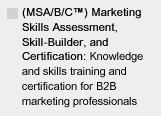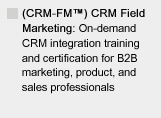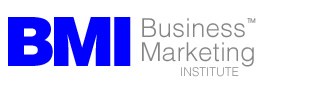MAKE SURE YOU CONTINUE TO RECEIVE EACH ISSUE OF TUESDAY MARKETING NOTES—CLICK HERE TO RENEW YOUR FREE SUBSCRIPTION
The Sales Rep De-Brief: How to Find Your Product’s Best Sales Benefits
by Eric Gagnon
Despite the role being played by social media and content in B2B marketing today, effective sales copy, utilized on your company's Web site, and used in every part of your conventional marketing program, is still the most important element for motivating semi-disinterested prospects to become leads as they respond to your mailing, print ad, e-mail promotion or other marketing campaigns.
This skill requires the ability to clearly, boldly, and effectively communicate the benefits or your company's product, and to describe how these benefits solve your prospect's business problems. What's more, the benefits used in your copy must be those seen by your prospects as problem-solving benefits, not the benefits you think your prospects will find compelling.
Often, however, the key to finding your product’s best, most persuasive benefits can be found right under your nose: By listening to your company’s best sales reps.
Most companies and clients that have been in business for at least a couple of years already have some experience in knowing something about how they sell their products. And it’s always a good bet that the best sales rep at these companies already knows what sells his or her product. So, as a marketing pro, you should be talking to these sales reps to find the benefits that actually work to persuade prospects to buy in the real world.
Sales is one of the few areas in business where people are actually paid what they’re worth, and the top sales rep in your company (or working for your client) has usually figured out how to effectively present and sell your product’s most important features and benefits to the prime prospects in your market. After all, selling your product is how they put food on their table.
Wherever you can find a business that’s been around a little while, with an established sales force in place selling their products, you can also find a sales rep there who’s already cracked the code on how to sell their product. All it takes is good listening on your part, and your willingness to run with good sales benefits when they smack you upside the head.
Debriefing Sales Reps for Fun and Profit
Since making sales is (or should be) the ultimate goal of your company’s marketing program, it only makes sense to debrief your company’s sales people as your first step in gathering the information you need to produce and execute effective deliverables for your marketing program.
Insiders in any company—Presidents, CEOs, Vice-Presidents, even marketing managers like you—are often dangerously insulated from what it really takes to sell their products. However, a company’s top salespeople do know the most important thing about your company’s product or service: Which features and benefits work best to help the rep close the sale.
Often, these features and benefits will be different, or expressed and positioned differently, than the benefits you, your management, or your ad agency have been presenting on your company’s products.
By listening to how your best sales rep actually sells your product, you can tap into this energy and bring it inside your company, to serve your efforts to market your company’s products more effectively. Talk to your sales reps, and talk to them often. They know what’s really going on.
How to Debrief a Sales Rep
Your job here is to be an extremely attentive listener and intelligence gatherer. Call a meeting, or attend your company’s next sales meeting. Take careful note as you listen to your company’s sales reps talk about your company’s products. Start out by asking your company sales reps to give you their best, standard sales presentation—as if you were the prospect on the other side of the desk.
Listen closely for the key benefits and those little “personal persuasion statements” that highly effective sales pros use to bolster their case. At this stage, you are looking for the real world-oriented, anecdotal, verbal selling points your salespeople use to convince the prospect.
Also pay close attention to the “you” benefits—how the salesman personalizes the benefits of using your company’s products or services, to you, the prospect. For example:
• “ . . . our system is like a promotional coupon for your readers, but because it’s Internet-based, the coupon promotion can change anytime your customer wants to change their promotion . . .”
• “. . . Mr. Jones, my customers tell me that since they put our company’s updated K4000 pumps online, they’re saving about 25% on their monthly fuel costs. I figure you could save about this much, too . . .”
• “ . . . sure, we could match the price of [competitor X], but at that price, would you get the same service from them that you already know you can get from us?”
• “ . . . our systems are in use by some pretty impressive companies, including [Big Companies X, Y and Z] . . .”
• “ . . . if you want the biggest savings and the most efficiency for your money, go with our Model 3D4, that saves you half the regular price of the electronic control package, that’s included in this upgrade . . .”
Quotes like these dropped in meetings with your company’s sales reps are gifts to every marketing pro, because they’re effective in front of real people. When incorporated into your marketing program, they can improve the sales response of your sales copy, deliverables, and promotions.
Here’s how each of these sales lines can be turned into a compelling piece of ad copy or a headline . . .

When listening to sales reps, experienced marketers knows when they hear a new copy point or positioning angle they can use in their next ad or brochure—and by listening carefully, you too can soon develop a highly-tuned sense for detecting usable and effective sales points that you can incorporate into you company’s next sales promotions. All you have to do is listen for them, write them down, and pass them along to your ad agency or marketing consultant who writes your company’s sales copy, or incorporate them into the copy you write for your clients.
Learn Which Benefits Work Best
While you’re listening to their pitches, ask your sales reps about each key benefit they present, and which benefit is the most important, then which one is the next important, etc. This helps you rank key all sales points in “good/better/best” fashion:
• “Good:” Sales benefits that belong in your company’s ad copy, or elsewhere in promotional text;
• “Better:” Sales benefits that belong in bold-faced ad subheads, bullet points or other, more prominent positions;
• “Best:” Key sales points that can stand alone as headlines in advertising, or as major selling hooks for brochures, signage or other collateral
How Do Your Salespeople Counter Common Sales Objections?
Next, ask your sales reps about the major objections or questions a prospective customer will commonly raise against these stated benefits. You want your sales rep to tell you what their prospects say to them, and what the sales rep says to counter the objection.
You can often incorporate these major sales “counters” in your company’s advertising copy to begin to pre-emptively anticipate and neutralize prospect objections. Answering objections in advance in your company’s promotional messages helps soften prospect’s potential objections, and helps your sales force to close their sales faster.
What Else Does Your Sales Team Have to Say? (Plenty!)
Next, try to gather as much other, free-form, anecdotal information from your salespeople on their experiences in presenting and selling your company’s products in the field:
• What are the prospect’s other areas of resistance to buying your company’s products? For example: Is the price for certain products in your company’s product line too high? Is a competitor’s product better in some key respect? If so, ask your sales reps how they handle these varied, wild-card objections;
• What other reasons do prospects have for saying “No?” For example, do prospects have major problems getting your product included in their company’s budget—if so, what (or who else at the prospect’s company) is the problem? This objection often means your ad copy needs to address the concerns of other people in the prospect’s company, or you need to be targeting these other contacts in addition to (or instead of) the current prospect’s job title in your marketing program;
• What do your salespeople really have to say about your company’s products, and how they stack up against those of your company’s competitors? Sometimes, an unguarded comment made by a sales rep can prompt you to make radical revisions in your marketing presentation and approach
Tease out any additional, off-the-record intelligence or other information that can be used in promotions, or that could help you head off big, potential marketing problems down the line, like rumors of new product announcements or price cuts by your competitors.
Sales reps at your company, or your client, have a lot to say, and what they tell you can dramatically improve the power, persuasiveness, and sales reponse of your marketing program.
All you have to do is listen!
Eric Gagnon (eric@businessmarketinginstitute.com), a director with the Business Marketing Institute, is author of The Marketing Manager’s Handbook and The CRM Field Marketing Handbook.








